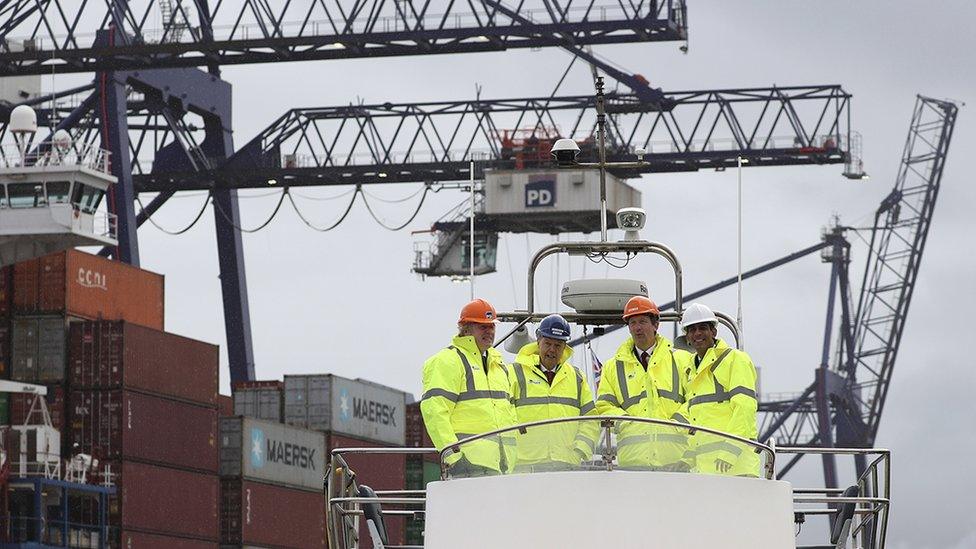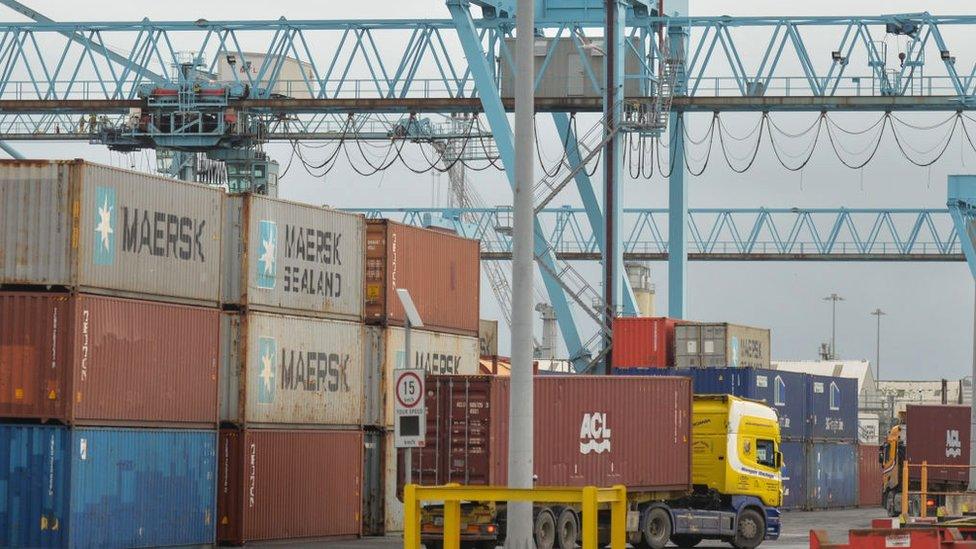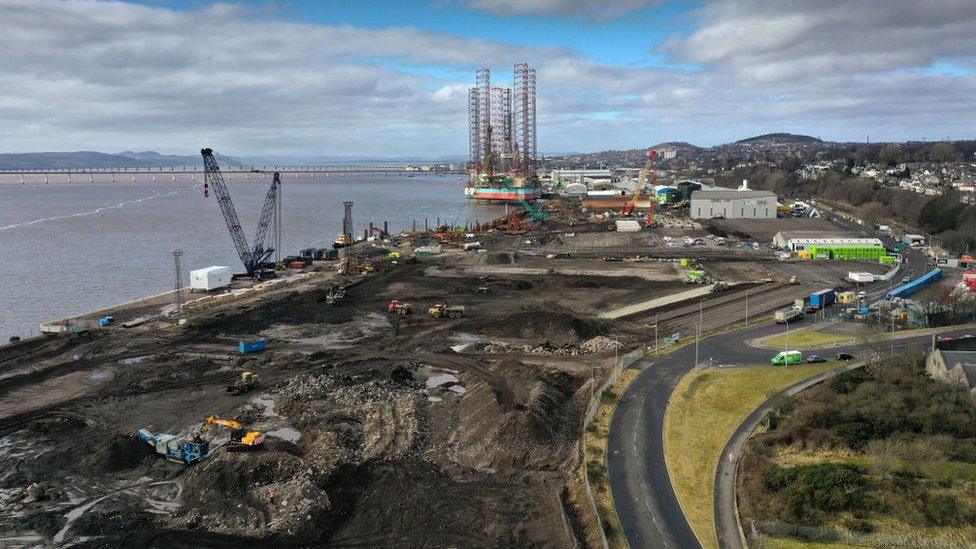Scotland set to have competing freeports
- Published

Boris Johnson and Chancellor Rishi Sunak visited the Teesside earlier this year - one of the first places set to get freeport status
Both the UK and the Scottish governments are to set out plans for zones with investment incentives, having failed to agree on a common approach or even a name.
They can offer a different range of tax breaks, but Westminster has the wider range of levers it can pull.
This is a new way in which the Scotland Office is putting a Union flag on priority projects - and that's seen in Holyrood as disrespectful to devolved powers.
Scotland is set to have two types of freeport, with the UK and Scottish governments setting them up in competition.
After the two administrations failed to agree on a common approach, the UK government plans to have at least one in Scotland in addition to eight in England.
The Scotland government also plans to have export promotion zones, with a focus on renewable energy and a guarantee for workers of at least the Real Living Wage.
How will they compete? Well, there's a lot of detail yet to be filled in.
To explain, freeports are a long-standing feature of trade - offering business tax breaks and avoiding tariffs as an incentive to invest and export.
Boris Johnson's government has pinned big hopes on them. In May, the eight zones chosen were mainly large, including the Thames, Liverpool City Region and the Humber, and on a smaller scale, Plymouth and East Midlands Airport.
Real or merely living?
From January, there was a terse exchange of letters between the UK and Scottish governments, in an attempt to devise a variation that worked with the use of both reserved and devolved powers.
Two weeks ago, Ivan McKee, the Scottish business minister, announced that attempt had failed.
One problem was the name. Holyrood wanted to brand them greenports, to show this was to be all about renewable energy and meeting net zero targets.

Freeports allow firms to import goods and then re-export them outside normal tax and customs rules
The UK government wants the same "freeport" brand across its realm. It expects a lot of the activity will be around renewable power, but doesn't want to be limited to that.
And it's understood the Real Living Wage requirement was vetoed by the Treasury. The Chancellor already has a "Living Wage", which is the minimum for those aged over 22, and is currently £8.91 per hour.
The "Real" variety is now £9.50 (more in London) and calculated each year by an independent commission, based on an assessment of household needs for a decent standard of living. With no reference to government, nor control by it, that's seen as beyond the Treasury pale.
A further point of disagreement was the seed funding required. At £25m each, the Scottish government was asked to fund one of two, unlike any such request in England.
Dashed hopes
As these tetchy exchanges, several made public, continued into and after the Holyrood elections, interest gathered pace in the parts of Scotland that could benefit.
The people with quaysides on the Cromarty Firth were quick to see the opportunity.
Forth Ports wants to see Leith, Grangemouth and Rosyth, using the rule from the English model that each part of the 'port' has to be within 45 km of the others.

Dundee is one of a number of Scottish sites suggested as a possible location for a free port
There's interest from Orkney as well as Shetland, Cairnryan, Montrose, Dundee, Aberdeen with Peterhead and - in keeping with some of the successful English bids from very large urban areas - Glasgow City Region.
But as bids were being worked up, hopes of a deal were being dashed.
They looked even less likely when the SNP did a deal with Scottish Greens on sharing power.
Greens are even more suspicious of freeports - seeing them as a carve-out of land where profits can be maximised, in their view on low wages, while minimising tax contributions and responsibility to the surrounding society.
Pulling levers
Last month, Mr McKee announced he had "no other option but to take forward plans to further develop our green port model which meets the specific needs of Scotland's economy".
On Thursday this week, he followed that up by convening around 60 people from private and public sectors to discuss how that might work.
The details, publicly at least, are sketchy. We could guess they'll include the Real Living Wage and they will be branded greenports. More detail is promised by the end of the year.
At least one problem Mr McKee faces is that a lot of the tax breaks are controlled by Westminster: National Insurance, investment allowances, corporation tax and so on. Importantly, that's also where tariffs are controlled.
The reckoning in London is that Edinburgh can only bring about 20% of the incentives to the freeport party; relief on business rates and on land and buildings transactions tax (LBTT), both of them devolved.
So Alister Jack, the Scotland Secretary, has more of the levers to pull as he also aims to publish a bidding invitation by the end of the year, and to have at least one freeport chosen by early next year.
Puzzled foreigners
It's increasingly clear that the Scotland Office is going to compete in this kind of arena.
It's also by-passing the Scottish and Welsh administrations on the replacements for European structural funds - going straight to local councils, and perhaps others, who can meet Westminster policy objectives with the Shared Prosperity Fund.
City and region growth deals are jointly funded by Scottish and UK governments. Projects will have the Union flag firmly attached to them.
And while the response from Holyrood, and from Cardiff Bay, is that such an approach disrespects the spirit of devolution, it looks like becoming an ever-stronger theme of the tensions between the governments.
How will inward investors see it? Probably as a bit puzzling. A lot of post-Brexit Britain looks that way to foreigners.
But they're no strangers to playing governments off against one another. In the USA, they play states against other states and against cities.
European state aid rules are intended to avoid that beggar-thy-neighbour bidding. Outside the EU, the UK government has not yet chosen how to play the state aid rules.
It's a big question, as competing to offer the biggest incentives is expensive, economically inefficient, and it goes against the conventional Tory grain. It could further antagonise Europeans, and lead to contract bidding opportunities being closed off.
- Published24 September 2021

- Published24 September 2021
